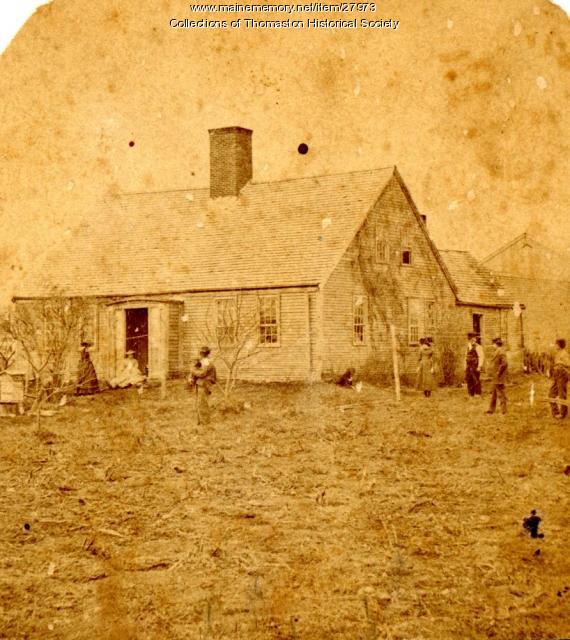Keywords: night scene
Item 71876
Dana Warp Mill at night, Westbrook, ca. 1938
Contributed by: Boston Public Library Location: Westbrook Media: Linen texture postcard
Item 23622
Pepperell Mill storehouse fire, Biddeford, 1915
Contributed by: McArthur Public Library Date: 1915-10-29 Location: Biddeford Media: Photographic print
Exhibit
A Portland newspaper wrote about an ice storm of January 28, 1886 saying, "The city of Portland was visited yesterday by the most inconvenient storm of the season."
Exhibit
Mural mystery in Westport Island's Cornelius Tarbox, Jr. House
The Cornelius Tarbox, Jr. House, a well-preserved Greek Revival house on Westport Island, has a mystery contained within--a panoramic narrative mural. The floor-to-ceiling mural contains eight painted panels that create a colorful coastal seascape which extends through the front hallway and up the stairwell. The name of the itinerant painter has been lost over time, can you help us solve the mystery of who he or she was?
Site Page
Historic Hallowell - Initiative and Self-Improvement
"… reports and poems, performed dialogs, enacted scenes from plays and debated. Their meetings extended over four years, and their papers were…"
Site Page
Thomaston: The Town that Went to Sea - Emerson Letter
"They left Saturday night and Sunday morning, the 4th Inst. after showing us all night. Saturday we worked in the trenches within one third of a mile…"
Story
I have thought about Vietnam almost every day for 48 years
by Ted Heselton
Working as a heavy equipment operator in Vietnam
Story
An enjoyable conference, Portland 2021
by John C. Decker, Danville, Pennsylvania
Some snippets from a 4-day conference by transportation historians in Portland, September 7-11, 2021
Lesson Plan
Grade Level: 9-12
Content Area: Social Studies, Visual & Performing Arts
When European settlers began coming to the wilderness of North America, they did not have a vision that included changing their lifestyle. The plan was to set up self-contained communities where their version of European life could be lived. In the introduction to The Crucible, Arthur Miller even goes as far as saying that the Puritans believed the American forest to be the last stronghold of Satan on this Earth. When Roger Chillingworth shows up in The Scarlet Letter's second chapter, he is welcomed away from life with "the heathen folk" and into "a land where iniquity is searched out, and punished in the sight of rulers and people." In fact, as history's proven, they believed that the continent could be changed to accommodate their interests. Whether their plans were enacted in the name of God, the King, or commerce and economics, the changes always included and still do to this day - the taming of the geographic, human, and animal environments that were here beforehand.
It seems that this has always been an issue that polarizes people. Some believe that the landscape should be left intact as much as possible while others believe that the world will inevitably move on in the name of progress for the benefit of mankind. In F. Scott Fitzgerald's The Great Gatsby a book which many feel is one of the best portrayals of our American reality - the narrator, Nick Carraway, looks upon this progress with cynicism when he ends his narrative by pondering the transformation of "the fresh green breast of a new world" that the initial settlers found on the shores of the continent into a modern society that unsettlingly reminds him of something out of a "night scene by El Greco."
Philosophically, the notions of progress, civilization, and scientific advancement are not only entirely subjective, but also rest upon the belief that things are not acceptable as they are. Europeans came here hoping for a better life, and it doesn't seem like we've stopped looking. Again, to quote Fitzgerald, it's the elusive green light and the "orgiastic future" that we've always hoped to find. Our problem has always been our stoic belief system. We cannot seem to find peace in the world either as we've found it or as someone else may have envisioned it. As an example, in Miller's The Crucible, his Judge Danforth says that: "You're either for this court or against this court." He will not allow for alternative perspectives. George W. Bush, in 2002, said that: "You're either for us or against us. There is no middle ground in the war on terror." The frontier -- be it a wilderness of physical, religious, or political nature -- has always frightened Americans.
As it's portrayed in the following bits of literature and artwork, the frontier is a doomed place waiting for white, cultured, Europeans to "fix" it. Anything outside of their society is not just different, but unacceptable. The lesson plan included will introduce a few examples of 19th century portrayal of the American forest as a wilderness that people feel needs to be hesitantly looked upon. Fortunately, though, the forest seems to turn no one away. Nature likes all of its creatures, whether or not the favor is returned.
While I am not providing actual activities and daily plans, the following information can serve as a rather detailed explanation of things which can combine in any fashion you'd like as a group of lessons.













